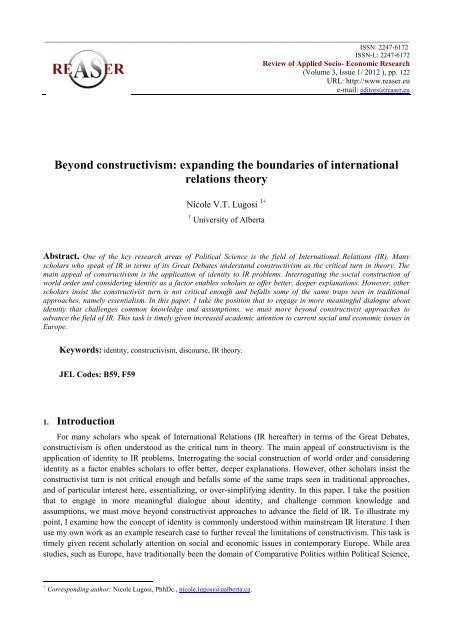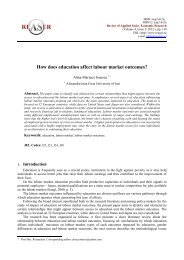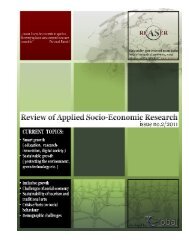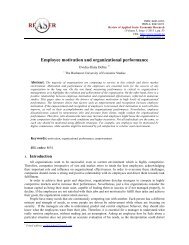Volume 3, ISSUE1/2012 - Review of Applied Socio-Economic ...
Volume 3, ISSUE1/2012 - Review of Applied Socio-Economic ...
Volume 3, ISSUE1/2012 - Review of Applied Socio-Economic ...
You also want an ePaper? Increase the reach of your titles
YUMPU automatically turns print PDFs into web optimized ePapers that Google loves.
________________________________________________________________________________________________<br />
ISSN: 2247-6172<br />
ISSN-L: 2247-6172<br />
<strong>Review</strong> <strong>of</strong> <strong>Applied</strong> <strong>Socio</strong>- <strong>Economic</strong> Research<br />
(<strong>Volume</strong> 3, Issue 1/ <strong>2012</strong> ), pp. 122<br />
URL: http://www.reaser.eu<br />
e-mail: editors@reaser.eu<br />
Beyond constructivism: expanding the boundaries <strong>of</strong> international<br />
relations theory<br />
Nicole V.T. Lugosi 1+<br />
1 University <strong>of</strong> Alberta<br />
Abstract. One <strong>of</strong> the key research areas <strong>of</strong> Political Science is the field <strong>of</strong> International Relations (IR). Many<br />
scholars who speak <strong>of</strong> IR in terms <strong>of</strong> its Great Debates understand constructivism as the critical turn in theory. The<br />
main appeal <strong>of</strong> constructivism is the application <strong>of</strong> identity to IR problems. Interrogating the social construction <strong>of</strong><br />
world order and considering identity as a factor enables scholars to <strong>of</strong>fer better, deeper explanations. However, other<br />
scholars insist the constructivist turn is not critical enough and befalls some <strong>of</strong> the same traps seen in traditional<br />
approaches, namely essentialism. In this paper, I take the position that to engage in more meaningful dialogue about<br />
identity that challenges common knowledge and assumptions, we must move beyond constructivist approaches to<br />
advance the field <strong>of</strong> IR. This task is timely given increased academic attention to current social and economic issues in<br />
Europe.<br />
Keywords: identity, constructivism, discourse, IR theory.<br />
JEL Codes: B59, F59<br />
1. Introduction<br />
For many scholars who speak <strong>of</strong> International Relations (IR hereafter) in terms <strong>of</strong> the Great Debates,<br />
constructivism is <strong>of</strong>ten understood as the critical turn in theory. The main appeal <strong>of</strong> constructivism is the<br />
application <strong>of</strong> identity to IR problems. Interrogating the social construction <strong>of</strong> world order and considering<br />
identity as a factor enables scholars to <strong>of</strong>fer better, deeper explanations. However, other scholars insist the<br />
constructivist turn is not critical enough and befalls some <strong>of</strong> the same traps seen in traditional approaches,<br />
and <strong>of</strong> particular interest here, essentializing, or over-simplifying identity. In this paper, I take the position<br />
that to engage in more meaningful dialogue about identity, and challenge common knowledge and<br />
assumptions, we must move beyond constructivist approaches to advance the field <strong>of</strong> IR. To illustrate my<br />
point, I examine how the concept <strong>of</strong> identity is commonly understood within mainstream IR literature. I then<br />
use my own work as an example research case to further reveal the limitations <strong>of</strong> constructivism. This task is<br />
timely given recent scholarly attention on social and economic issues in contemporary Europe. While area<br />
studies, such as Europe, have traditionally been the domain <strong>of</strong> Comparative Politics within Political Science,<br />
+ Corresponding author: Nicole Lugosi, PhhDc., nicole.lugosi@ualberta.ca.








